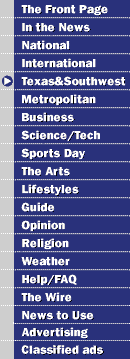|
03/13/93
Lawyers complain of secrecy on U.S. documents about cult
By Bruce Nichols / The Dallas Morning News
WACO-Lawyers continued to chafe Friday at what they called the secrecy surrounding court documents that explain the government's legal position in the Branch Davidian standoff.
"We are mystified by the absolute secrecy and star-chamberlike proceedings in this case,' said lawyer Kirk Lyons.
Mr. Lyons and other lawyers interested in aiding the cult have been rebuffed in their efforts to win court-sanctioned access to the sect's leader, David Koresh. They've also complained about the decision by federal authorities to cut off outside telephone calls to the compound.
Dan Conroy, a Bureau of Alcohol, Tobacco and Firearms spokesman, has declined to release details of the warrant originally issued for the Feb. 28 raid, in which four ATF agents were killed.
He said that and other legal documents related to the siege remain sealed to the public because they contain information that could affect the federal investigation.
During a news conference Friday, Mr. Lyons and others lawyers renewed their complaints about U.S. District Judge Walter Smith Jr.'s rejection of their request to allow them inside the compound to provide legal counsel.
Mr. Lyons, executive director of Cause Foundation Inc., an organization he describes as devoted to conservative civil liberties issues, said the judge gave insufficient explanation for denying the request. The judge also sealed the government's response to the lawyers' motion.
"All of the federal documents, which normally would be public record, are secret and sealed, most important of which is the initial probable cause upon which the government based its attack on Mount Carmel,' Mr. Lyons said.
U.S. Attorney Ronald F. Ederer in San Antonio did not return telephone calls Friday, and Judge Smith "does not talk to the news media,' a secretary said.
An assistant U.S. attorney in Dallas said sealing documents before an arrest is common in criminal cases, particularly those involving violence or drugs.
"You can't just do it,' said Assistant U.S. Attorney Len Senerote of Dallas, emphasizing that he knew general procedure but not the specifics of the Waco case.
"A judge has to approve, and there has to be a good reason.'
Typically, the reason cited is that information in the sealed
documents would jeopardize an investigation or the lives of people helping with the inquiry, he said.
Mr. Lyons said the lawyers plan to ask the 5th U.S. Circuit Court of Appeals in New Orleans to order Judge Smith to unseal documents related to the government's legal position.
On Thursday, Mr. Conroy announced an indictment against cultist Paul Fatta, who was at a gun show when the raid occurred, charging him with conspiracy to manufacture and possess a machine gun. Again, the indictment was sealed, with Mr. Conroy saying it contained details pertinent to the investigation.
"They will not be unsealed until the appropriate time,' Mr. Conroy said.
Mr. Lyons agreed sealing of documents is a "depressing trend' but "just because they're doing it doesn't mean we should let them get away with it.'
He said they would await Judge Smith's ruling on a separate habeas corpus petition demanding access to Mr. Koresh before filing the appeal.
Also pending is an application for habeas corpus filed by Dick DeGuerin, a noted criminal lawyer from Houston acting on behalf of Mr. Koresh's mother. Mr. DeGuerin also wants to be allowed inside the compound.
"He needs some advice from people who aren't pointing a gun at him,' DeGuerin said. "My job is to talk to my client.'
Mr. Lyon said bringing in neutral negotiators could help end the stalemate. "We're not saying use us. Use somebody. Try it,' Mr. Lyons said.
The government's actions involving the documents comes amid an announcement Thursday by the directors of the FBI and ATF, warning agents that "loose and often uninformed' public comments could hurt efforts to end the standoff.
"We all have much to be proud of,' said a joint statement by FBI Director William Sessions and ATF Director Stephen Higgins. But they cited "unnamed agents speaking to the media about aspects of both operations and critical of the other agency.'
|


![]()



